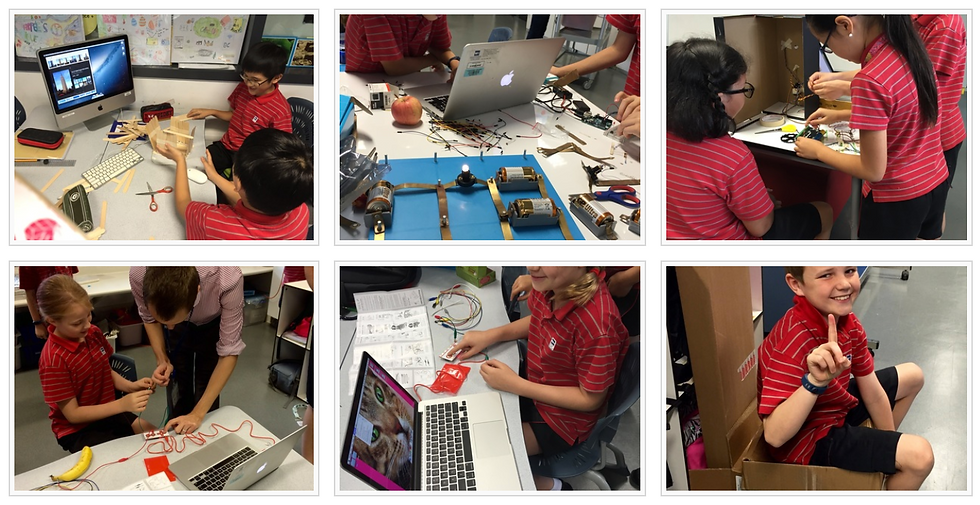First published 1/7/2016

This was our third foray into 'Time to Create' with Year 5 students. We began as always, with a story connected to the attitudes of resilience and having a growth mindset. Indeed our favourite quote from the books was "Your brilliant first flop was a raging success!" We talked about facing challenges and having time to refine original ideas or even be prepared to abandon something and restart from scratch. We didn't give the students a set of success criteria or a plan. Some students decided to draw a plan but most got straight into creating.
What did we do?
We divided the class randomly into three groups and set the following activity stations up:
1. Design and make a chair out of cardboard that will support your own body weight.
2. Design and create a structure of your own choice using popsicle sticks.
3. Design and create something that has an electrical circuit with in it. Materials included some of the Makey Makey Kits, Arduino electronics kits, and a Hummingbird robotics kit, as well as normal batteries, wires and switches.
What did we notice? (connected to our original "KNOW-DO-BE" outcomes)
• Attitudes of persistence and resilience
• Students developed their creative designs. Most groups fine tuned their ideas as they progressed.
• Strong engagement and high interest with most students choosing to work collaboratively.
• Students really grasped the concept of "Challenges = Successes with failures along the way" to help refine and improve. We try to enforce this in all learning but although it was understood today it is not so clear to students and parents in other core subjects.
• From the debrief after session: “If we could work until we finished without stopping for other things it would be great. It gives you time to think things through.” More food for thought about collapsing timetables to allow extended periods of time on projects...
From Challenges to Successes
I watched as one student repeatedly alteredand refined their design for almost an hour, often talking out loud as they thought about what would be the best option to add the improvement. Some students referred back to what they had previously studied with circuits and said, "That was too easy, this is the real challenge." I look back at a typical lesson plan around circuit building and tend to agree.
From Challenges to Failures
The arduino electronics kits needed more front loading with video tutorials or step by step guidance rather than 'free play'. Having said this, I also recognise that only one group really struggled and felt uncomfortable with the new learning without structure. I wonder how often students get chance to experience true failure like this and actually quit. There was no desire to do some independent research to find out what others had done with the kit or to get up and move to another group and try something different.
From Challenges to Failures to Successes
Several students recognised themselves as falling into this category. Most experienced a fair amount of challenge but also failed along the way and then refined and adapted until they experienced success. Most completed a 'final product' but didn't want to end there. During our end discussions the students talked about how important it is to keep improving and adding to a first build.



תגובות